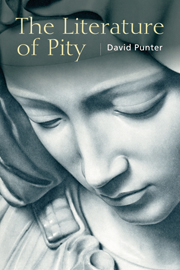Book contents
- Frontmatter
- Contents
- Plates
- Preface
- Acknowledgements
- 1 Distinguishing Pity
- 2 Pity and Terror: The Aristotelian Framework
- 3 Pietà
- 4 Shakespeare on Pity
- 5 The Eighteenth Century
- 6 Blake: ‘Pity would be no more …’
- 7 Aspects of Victoriana
- 8 Chekhov and Brecht: Pity and Self-Pity
- 9 ‘War, and the pity of War’: Wilfred Owen, David Jones, Primo Levi
- 10 Reflections on Algernon Blackwood's Gothic
- 11 Pity's Cold Extremities: Jean Rhys and Stevie Smith
- 12 Reclaiming the Savage Night
- 13 ‘Pity the Poor Immigrant’: Pity, Diaspora, the Colony
- 14 Lyric and Pity
- After Thought: Under the Dome
- Notes
- Bibliography
- Index
4 - Shakespeare on Pity
Published online by Cambridge University Press: 05 September 2014
- Frontmatter
- Contents
- Plates
- Preface
- Acknowledgements
- 1 Distinguishing Pity
- 2 Pity and Terror: The Aristotelian Framework
- 3 Pietà
- 4 Shakespeare on Pity
- 5 The Eighteenth Century
- 6 Blake: ‘Pity would be no more …’
- 7 Aspects of Victoriana
- 8 Chekhov and Brecht: Pity and Self-Pity
- 9 ‘War, and the pity of War’: Wilfred Owen, David Jones, Primo Levi
- 10 Reflections on Algernon Blackwood's Gothic
- 11 Pity's Cold Extremities: Jean Rhys and Stevie Smith
- 12 Reclaiming the Savage Night
- 13 ‘Pity the Poor Immigrant’: Pity, Diaspora, the Colony
- 14 Lyric and Pity
- After Thought: Under the Dome
- Notes
- Bibliography
- Index
Summary
It would be foolish to attempt to trace the trajectory of pity through Shakespeare's works; the term occurs, as one might expect, many times, and in many different contexts. Indeed, as with so many other terms, we might say that Shakespeare almost defines the term; although it occurs, of course, always in a complexity of more or less strict historical contexts, it participates also in what we might call a ‘flow of aphorism’ which has all that illusory, ‘literary’ appearance of transcending history.
We might begin from King Henry's musings towards the end of Henry the Sixth, Part Three (1591). He has despatched his supporters on various military errands, and is left alone with Exeter, who fears the worst; there may be something of a match between the powers of the opposing parties, but, Exeter suspects, Edward ‘will seduce the rest’. Henry cannot, it seems, see why or how this should be so:
That's not my fear, my meed hath got me fame:
I have not stopp'd mine ears to their demands,
Nor posted off their suits with slow delays;
My pity hath been balm to heal their wounds,
My mildness hath allay'd their swelling griefs,
My mercy dried their water-flowing tears;
I have not been desirous of their wealth,
Nor much oppress'd them with great subsidies,
Nor forward of revenge, though they much err'd:
Then why should they love Edward more than me?
- Type
- Chapter
- Information
- The Literature of Pity , pp. 35 - 46Publisher: Edinburgh University PressPrint publication year: 2014

